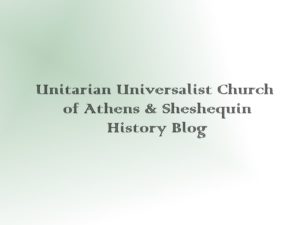In the 1800’s, local associations of Universalist congregations were responsible for fellowshipping and ordaining ministers, and for addressing complaints about inappropriate behavior by clergy. For the latter function, each association had a “Committee on Discipline.”
Complaints were pretty rare, but there was one case in Bradford county in the early 1840’s. I found this story interesting not only because it involves our Sheshequin ancestors, but also because it illustrates the logistical difficulties of conducting business in the days before electronic communications. And I was intrigued by the conclusion of the investigation.
The subject of the complaint, Reuben W. Cheney, was born about 1811 in Vermont and moved with his parents to Windham in Bradford county in the 1820’s. In 1837 he was granted a letter of fellowship – essentially a license to preach – by the Susquehanna Association, of which the Universalist societies in Bradford county were members at that time. Cheney settled in Springfield, Bradford county, where he probably preached to the local congregation.
At the October, 1841, meeting of the Susquehanna Association, the Committee on Discipline reported that “charges had been made against Br. Cheney, but were not substantiated.” Cheney was not present at that meeting.
The matter was apparently not laid to rest, however. During the first day of the 1842 annual meeting, a letter was presented from the Rev. G. S. Ames of Sheshequin, containing complaints against Cheney. (Neither Ames nor Cheney was present.) The letter was referred to the Committee on Discipline, which presented the following resolution the next day:
“Whereas, Certain charges of immoral conduct and dishonesty have been preferred against Br. R. W. Cheney, who is in fellowship with this Association, and as the charges appear to be well founded; therefore,
“Resolved, That the said Br. R. W. Cheney be cited to appear before this council at the next annual meeting of the Association, to answer to the said charges.”
The resolution was adopted. The delegates also voted at this meeting to form a new association, the North Branch, from the congregations in Tioga, Bradford, and Lycoming counties.
Another year went by, and the charges against Cheney were again brought up at the 1843 meeting of the Susquehanna Association. Cheney was not present, and the Committee on Discipline reported that:
“they had not been able to find his residence, and for want of proper evidence before them, in consequence of the charges being preferred against him in the North Branch Association, they recommend the whole matter to be referred to the North Branch Association, with full power to act as they shall deem expedient.”
The North Branch may not have known where Cheney lived, either. The announcement of the June, 1844, North Branch meeting, which was published in the weekly Universalist Union, included the following invitation:
“The Standing Clerk calls upon R. W. Cheney to be present, as by a reference to the Minutes of the Susquehanna Association, he will find it to be of interest to him.”
Cheney, who was living in Spencer, N. Y., apparently got the message and showed up for the North Branch meeting in Monroeton. However, the entire meeting was taken up with other business, including a review of the draft constitution for the new association. A second meeting was scheduled for September in Sheshequin to address the charges against Cheney.
At that meeting, the charges were the first order of business, but Cheney didn’t arrive until after the end of the first day, so his “trial” was postponed until the second day. Cheney was assisted in his defense by O. H. P. Kinney, a son of Joseph Kinney who had studied law. The minutes state:
“The charges against Br. Cheney were then taken up and occupied a session of six hours. After a full and thorough examination of testimony, in which Br. Cheney himself, and his counsel, O. H. P. Kinney, Esq., participated, the charges were acted upon separately, and resulted in not being sustained.”
The minutes do not state whether his accuser was present; G. S. Ames had left Sheshequin in June, 1843, and moved to Susquehanna county.
Association meeting minutes were generally published with an accompanying “Circular Letter,” or remarks, written by the Clerk of the meeting. About this meeting, Clerk George W. Kinney of Sheshequin, wrote:
“The trial of Br. Cheney attracted much attention, and I hope it has not passed off without some salutary and lasting lessons of instruction to him. To say that the charges were without any foundation would be assuming too much; but we believe in all sincerity, that not even the shadow of a foundation will hereafter exist for censure. If I am not deceived in the head and heart of our brother, the shoals and quicksands which came so near wrecking the bark of his usefulness, as a Universalist minister of the Gospel, will be hereafter studiously avoided.”
After three years and five association meetings, the unspecified charges against Br. Reuben Cheney were finally resolved. While he was found “not guilty,” he was not quite innocent, but the council apparently felt that he had learned his lesson.


